In 1984 former Blam Blam Blam bassist Tim Mahon wrote a touring guide for bands playing venues around the country such as pubs, halls, and galleries. Two years earlier he was injured when the Blams’ van crashed near Whanganui.
While some of the touring guide has dated – cell phones and the internet were years away from becoming commonplace, and venues and contacts have come and gone – much of his advice remain timeless. This first appeared in Rip It Up, June 1984, as “Tim’s Road Guide” and is republished with permission.
--
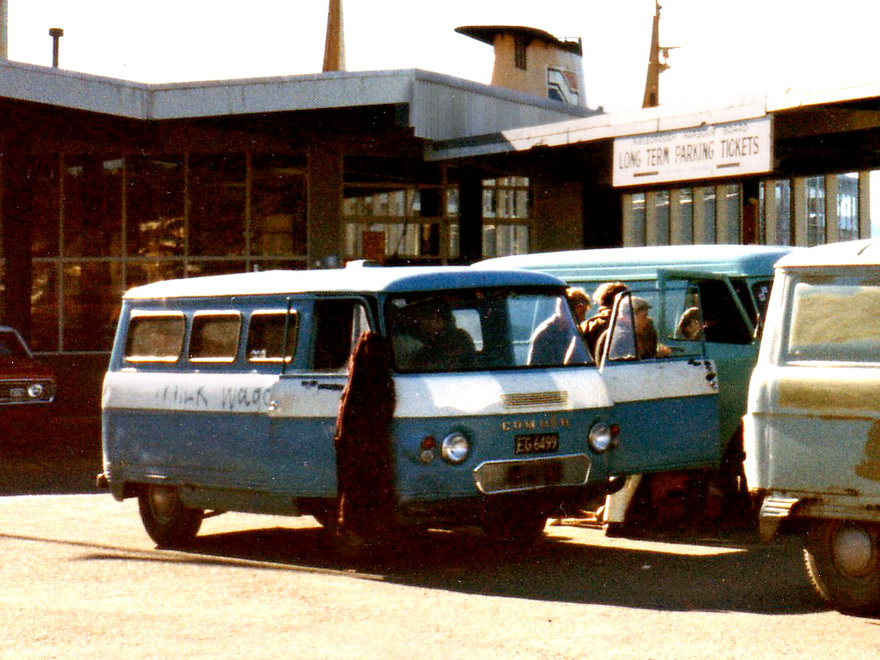
The Blam's Commer van, known as The Milk Wagon, on the Screaming Blam-matic Roadshow - Photo by Jenny Pullar
Soon after the Blam Blam Blam reunion in early 1984 bassist Tim Mahon left these shores for England. He left behind a wealth of experience in touring New Zealand with the Whizz Kids, Blams and Export Lamb, not to mention those he has helped out, like the Gurlz and Miltown Stowaways.
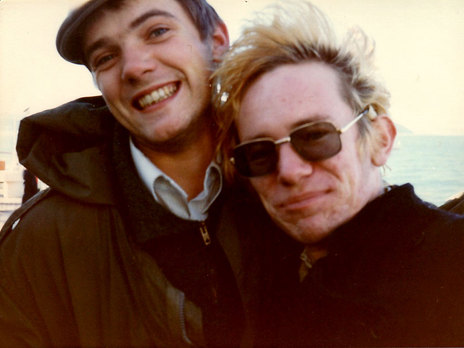
Tim Mahon (Blams) and Yoh (Meemees) on the Cook Strait ferry heading from Wellington to Picton, Friday 17th July, 1981 - Photo by Jenny Pullar
In an effort to help others avoid the mistakes he made, Mahon helped Rip It Up prepare a basic practical touring guide. He has concentrated particularly on alternative ways of touring, such as art galleries.
The Homework
You should never even consider touring without first doing your homework. The first step is a press kit. Your press kit should contain information on who is in the band, when it was formed, etc, press clippings and details on record(s). If you can do it properly, it’s a good idea to write up something that a lazy reporter can put straight in the paper – such a story must have an “angle”. However, a simple history of the band won’t do.
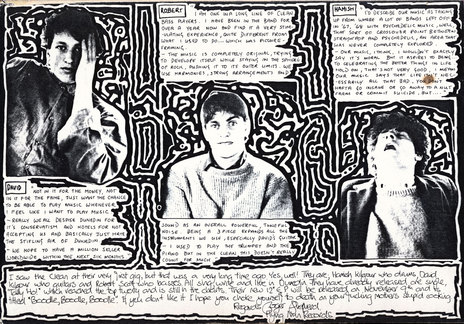
The back of the Boodle Boodle Boodle pop-up press kit, 1981 - Murray Cammick Collection
You should have enough kits to send to everyone you’re liaising with for gigs – pub managers, radio stations (especially student stations), newspapers, etc. Photos are a good idea and someone like Pressprint in Auckland will run off a hundred prints for $500 or so.
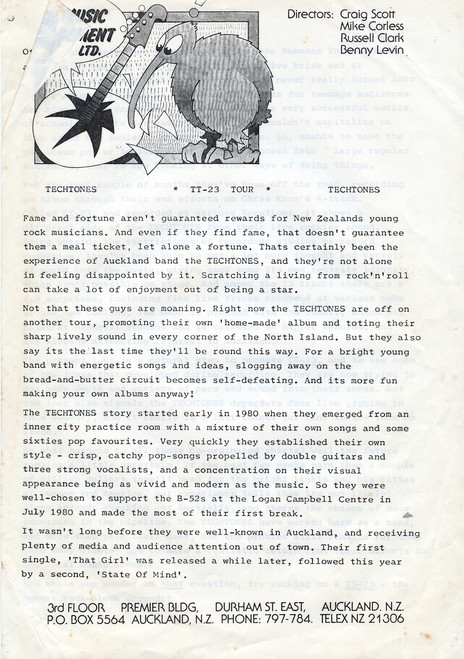
First page of a two-page press release on the Techtones from New Music Management, promoting their album and tour. - Steve Roach collection
The big thing is to get your presentation done a month before you go away at the latest. That means when you’re on the phone booking gigs you can post immediately the material to help your case to get guarantees, accommodation, etc. That’s all negotiable.
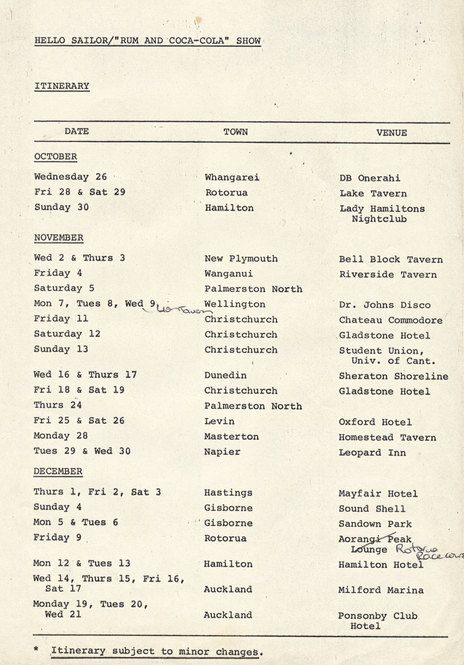
1977 Hello Sailor tour schedule as supplied to the band and media, promoting their debut album - Murray Cammick Collection
Bromides
Bromides are the originals of the ads you put in newspapers [which can go straight into their layouts]. It’s good to have a tour bromide because papers can mess things up horribly. I remember The Plague being called the Plaque once in New Plymouth – maybe we should have played with the Dentists.
Records
Having a record is a big help for touring. It is possible without but having one gives you extra support from radio, reviews, etc. If you haven’t got one it might be a good idea to send out some demo tapes.
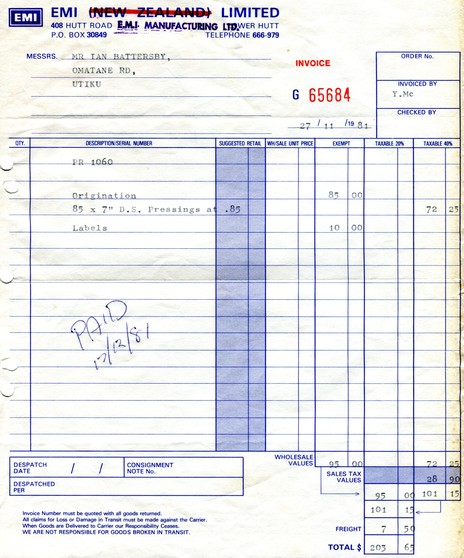
The cost of getting 85 singles pressed at EMI Lower Hutt, 1981, tax included. - Ian Battersby Collection
Posters
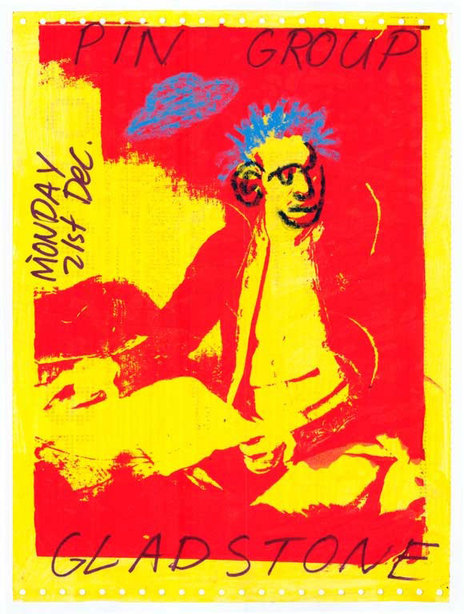
The Pin Group at the Gladstone, December 21, 1981 - Screenprinted poster design by Ronnie van Hout
We’ve found screening posters is the cheapest way. The charge for getting a screen made isn’t much and from then on it’s paper (which you can sometimes get cheap), ink and labour.
Budgeting
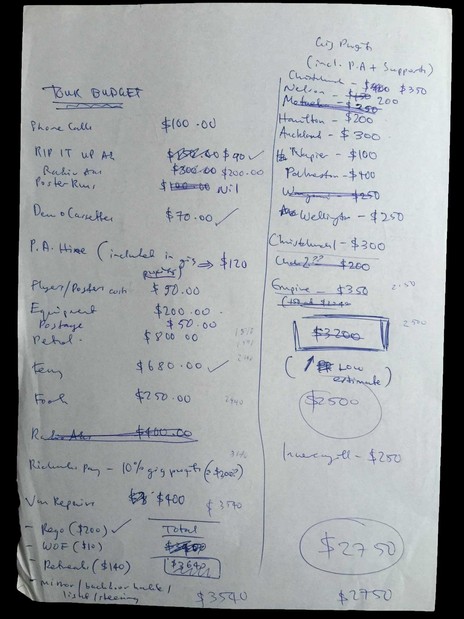
The 1993 Age Of Dog tour budget
You must budget a tour properly before you go. Items should include petrol, PA, lights, spare sticks and strings, food ...
The Post Office
If you’re booking a tour you’re going to make a few toll calls. Make them all “price required” so you can keep track of everything from the start. You need to be at a phone number where people can reach you and where you can make all your toll calls from the one phone.
Postage can cost a lot. Within each island, surface mail is just as quick as air. Len Lye says, post early.
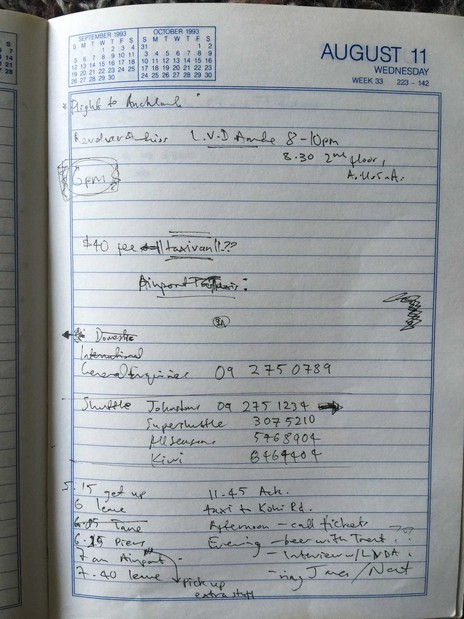
Notes for the 1993 Age Of Dog tour. An interview with Lisa Van Der Aarde at 95bFM for Freak The Sheep is mentioned.
Friends
A tradesman is a band’s best friend. If you’ve got a mate who’s a printer or a mechanic you’ll need them and, it they’re into music, they’ll help you. If it costs you a bottle of Scotch or whatever, it’s worth it. Your friends on tour are other musicians, they should help you out. That’s the only way it can work, when musicians get together and help each other out.
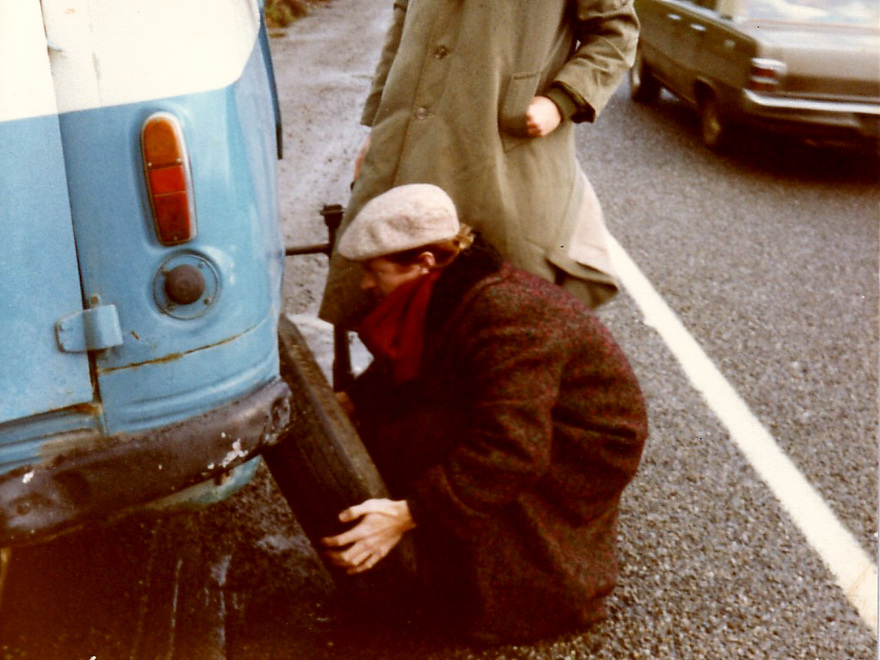
On the road again ... the Screaming Blammatic Tour. - Photo by Jenny Pullar
The Arts Council
The Arts Council has a touring grant of $750. You won’t get it if you’re just doing pubs, only if you play alternative venues as well. So if you’re going to do it yourself it’s worth working a little harder and getting the alternative venues happening. You can also get support from the local arts council. All councils have a certain amount per year to give out to performing artists.
Brendan Smyth at the QEII Arts Council in Wellington is very helpful, particularly if you have something that’s new and good and is going to amuse people, like a big roadshow.
Art galleries
One of the beauties of places like these is you don’t need a PA – you need monitors. I believe that the best thing for bands to do is get away from the big PAs and lighting rigs. Unless, of course, you do get to that stage where you have released records and people expect it of you. Some galleries aren’t sympathetic but those listed below issue will generally be pleased to have you play.
The Van
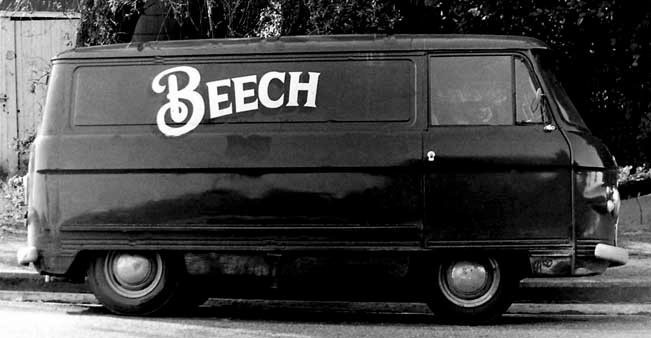
Commer van owned by Beech, Christchurch, 1974
If you feel you’re going to do okay on tour and you want to be hassle-free, hire a van.
If you own one, go over it with a fine-tooth comb before you go away. Make sure all tyres are brand new, the brakes aren’t going to crap out and so on. Always carry a comprehensive toolkit, clutch and brake fluid, lots of oil, bits of hose, bits of string, gaffa ...
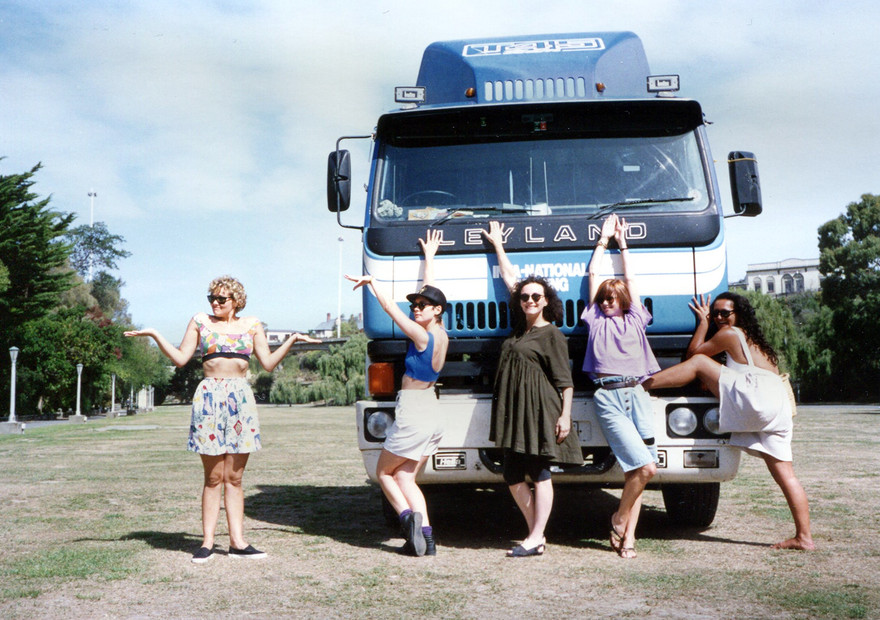
Big wheels keep on turning. When The Cat's Away on tour (L-R): Kim Willoughby, Margaret Urlich, Debbie Harwood, Dianne Swann, Annie Crummer. - Rikki Morris
One Commer did 350,000 miles on 14 tours of the country before I put a new motor in it and that was only a 1700cc van. A Thames Trader is another good van, as is the little Toyota Liteace (the Hiace isn’t as good). The Morris Commercial is really good, slow and steady. Bedford Jumbos aren’t built to carry PA systems. They’re not built for the weight unless you make expensive modifications.
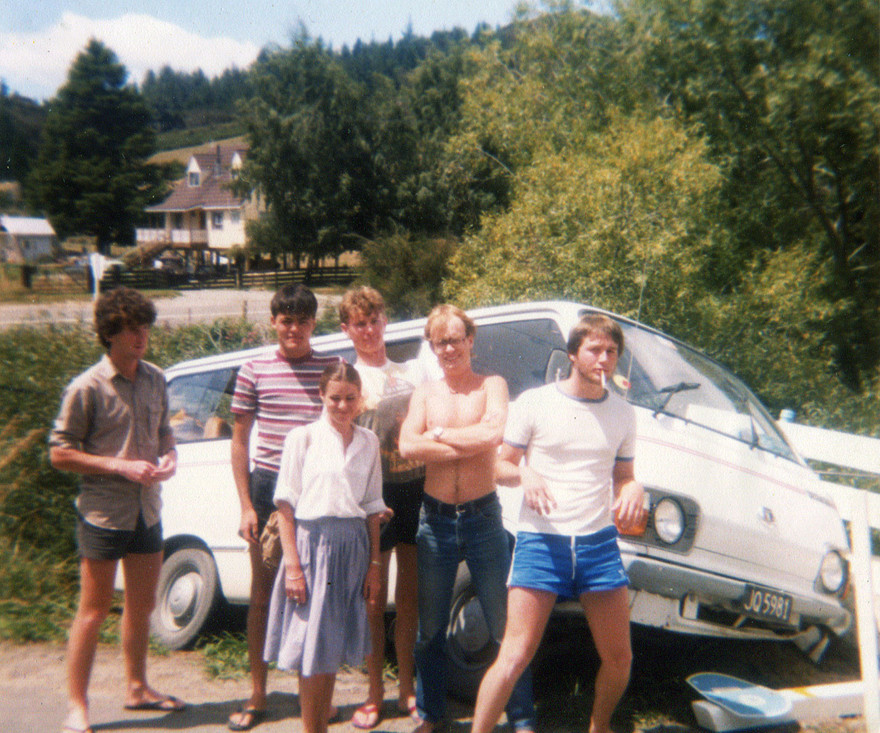
The risks of ongoing touring – assorted Netherworld Dancing Toys with their just crashed van in the South Island. Happily, nobody was hurt. - Nick Sampson collection
Join the AA. You’ll be glad of their help when you break down miles from anywhere.
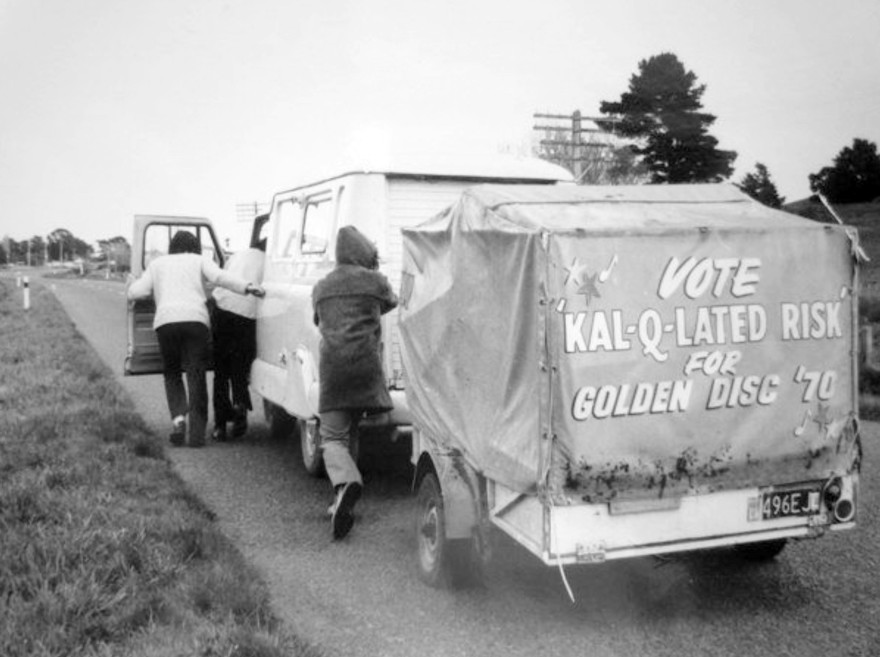
"Join the AA": The Kal-Q-Lated Risk get a push start without losing a promo opportunity, 1970.
Packing
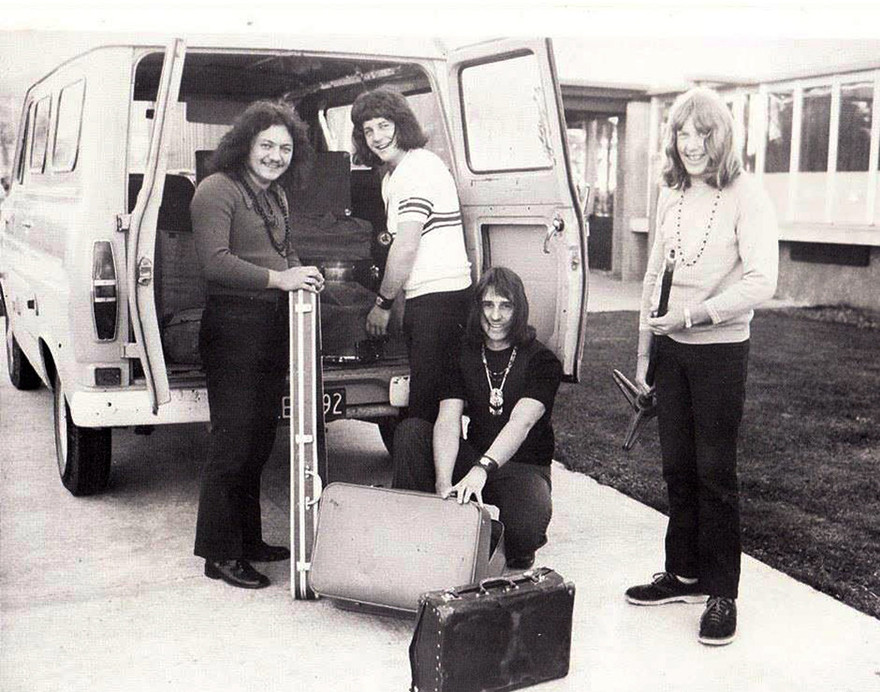
Creation with the van formerly owned by The Dedikation, circa 1972. Left to right: Glenn Timihou, John Rarity, Johnny Morris, Greg Christensen.
Tight packing is a must. Road cases are essential if you want your equipment to stay in good condition, otherwise lots of blankets and sleeping bags wrapped round the bits. Cases aren’t cheap to buy but you can find suitable boxes and things at the dump – I have. Old suitcases can be useful and they’re easy to pack.
Driving
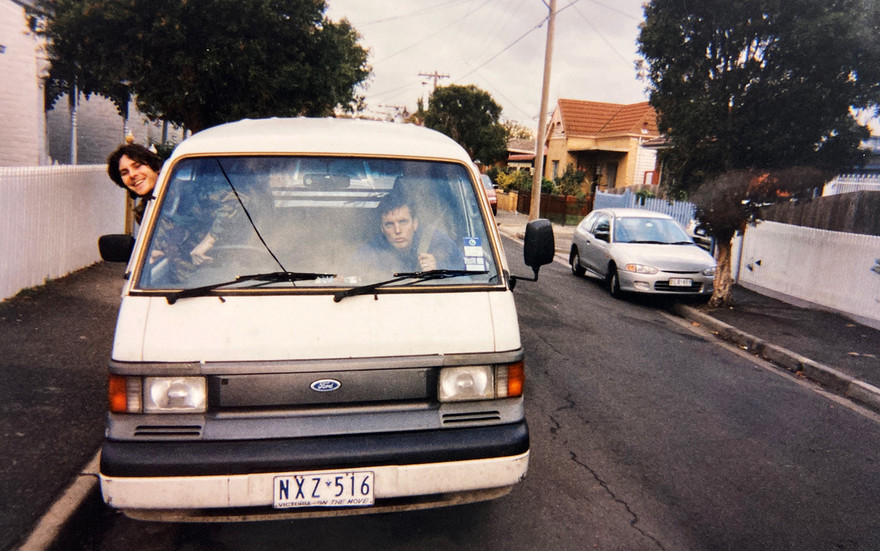
Craig Terris with Fur Patrol guitarist Steve Wells in the Fur Patrol van, Melbourne.
When you’re driving long hauls you have to have several drivers. And each driver must have a co-driver, whether the other person can drive or not. When the Blams’ accident happened everyone but me in the van was asleep. Usually David Rudolph, who didn’t even have his licence, used to stay up with me but not this time.
Don’t drink. Don’t smoke dope.
Staying
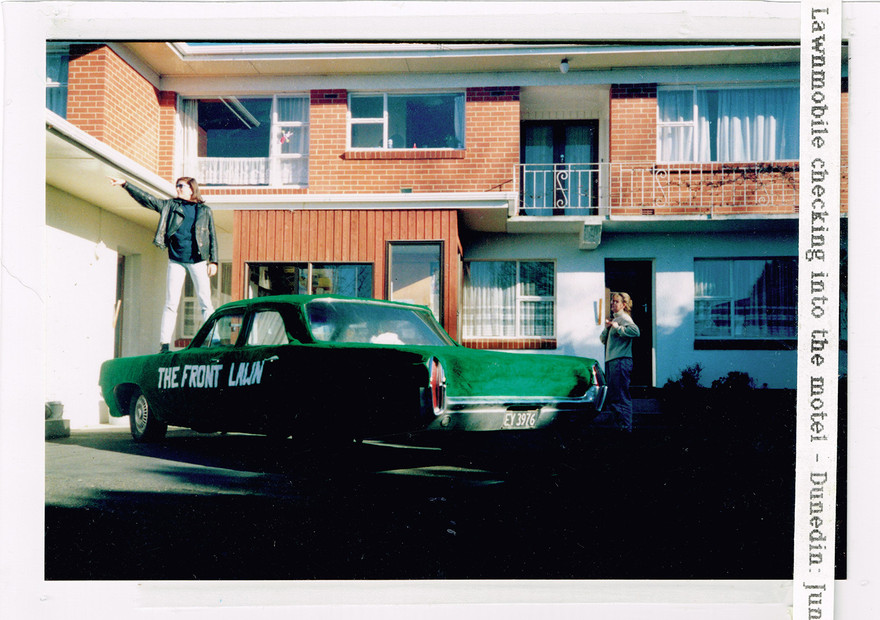
The Front Lawn "Lawnmobile" checking in to a Dunedin motel, with Jennifer Ward-Lealand at left. - Don McGlashan collection
Sleeping on people’s floors is cheaper than staying in motels and it’s usually more fun: when the Blams were touring with Split Enz we went up to Neil’s room at the Abel Tasman in Wellington and told him about this place we were sleeping at on The Terrace that had a huge fish tank full of seahorses and things, and he wanted to come and doss down with us.
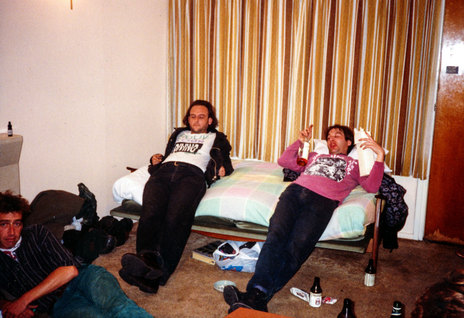
Able Tasmans in a Dunedin motel, post-gig early 1990s. L to R: Craig Mason, Peter Keen, soundman Tex Houston - Graeme Hill collection
Staying in motels is boring. So if you’ve got mates and they don’t mind, stay with them. Buy them a bottle of Scotch and you’ve got good accommodation. You meet people and I think that’s one of the best things about touring. But of course there’s not much privacy so if you want that, get a motel.
Motels
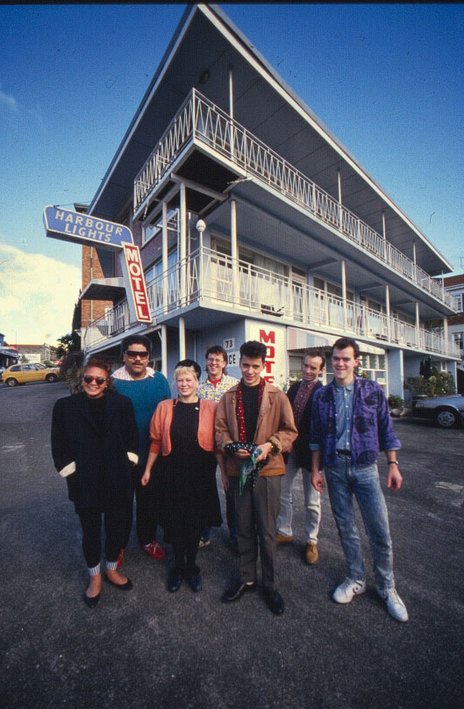
The Holidaymakers check out the Harbour Lights Motel, Parnell, 1988. From left: Mara Finau, Pati Umaga, Barbara Griffin, Richard Caigou, Peter Marshall, Stephen Jessup, and Andrew Clouston. - Murray Cammick collection
There are good, cheap motels in most centres – ask other bands. But don’t throw TV sets through the window or anything. Tidy up after yourselves. Musicians who are animals fuck it up for everyone else. You might arrive there and look strange and be stared at but if you act reasonably they’ll cheerfully have you back.
PA
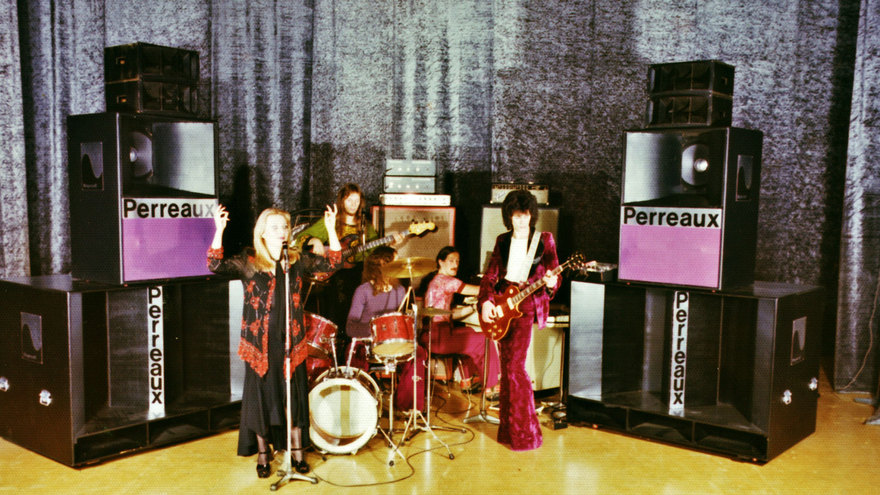
Ragnarok with their live PA.
A big PA will cost you up to $500 a week but you don’t really need that much. A bass bin and one a side is fine. It’s best to take your PA with you because you get to know it and how it works.
Soundmen – once you get your mics you look after them. Hold on to them, never let them out of your sight because they’re worth as much as $300 each and they’re easy to steal. Never leave any gear lying round, lock it up in the van. It’s often a good idea to immobilise the van. Vans are easy to steal and you don’t want to kiss all your gear goodbye.
Money
Don’t let people fuck you around over money. If you’ve got a written contract and they renege on it, go and see a lawyer, the law’s on your side. Don’t threaten to beat people up, although I must confess I have done that ...
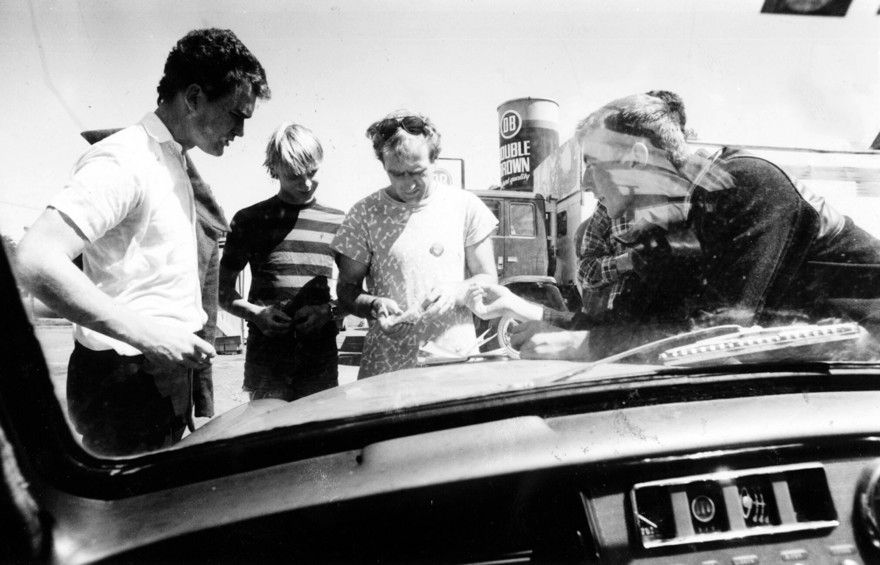
Divvying up the money, Looney Tour, 1984
Petrol coupons are a really smart idea. Carrying a lot of money on the road is dangerous because you’ll find yourself saying: “Hey, let’s stop for a Devonshire tea!” We were famous for that, we used to stop for Devonshire teas every 10 miles. But it’s better to stop in at a pub and buy a dozen Steinlagers and get a couple of loaves and some Camembert from a deli and stop by a river somewhere. That’s good if you’ve got the time because it breaks up the trip.
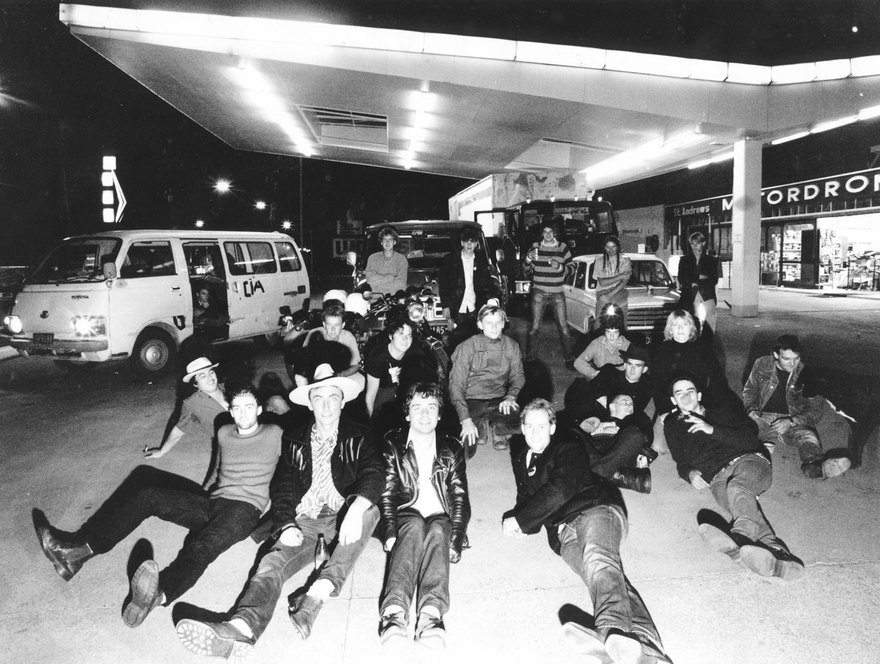
The Looney Tour, February 1984, with promoter Doug Hood, left, with hat - Photo by Terry Moore
When you get money you must bank it regularly. The amount of money that’s been stolen from tills, hotel rooms, everywhere ...
Take your own door person on tour, someone you can trust. It’s unlikely that you’ll get cheated but if you have your own person there you can’t moan.
Door Prices
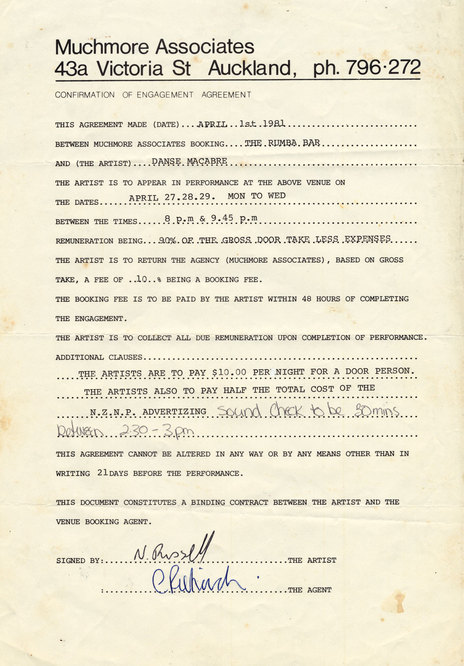
A 1981 band agreement from the Rumba Bar. Danse Macabre were to play between 8pm and 9.45pm Monday to Wednesday for 90% of the door take - less expenses, $10 for the door person and half the advertising cost. Given the fact that on those days of the week the number of paying customers would many times be in single figures, a band could often expect to be paying to play.
I think it’s time people charged at least $5 on the door. You can’t survive on the road unless you do.
Guarantees
Not many places give guarantees now, it gets worse every year. But that shouldn’t matter because you’re either going to do it and you’re good or you’re not.
Support Bands
Support bands have to realise that going on the road costs a lot. A reasonable fee is $60-70 a night – any lower’s a bit silly.
Extra Bucks
Selling T-shirts and tapes or records at the door can be a nice money spinner. Avant Garage made nearly $1000 selling tapes.
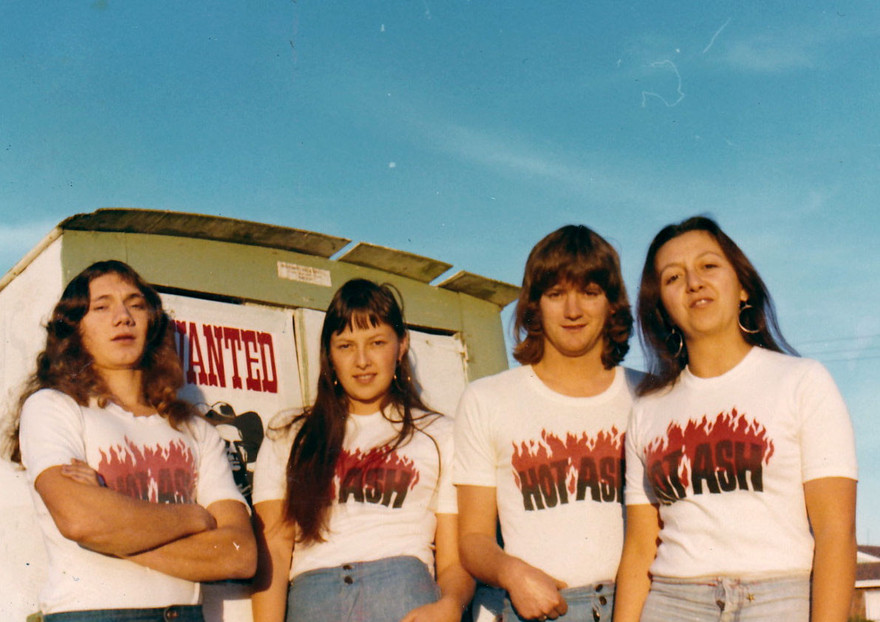
Hot Ash in band T-shirts, 1973. Left to right: Gordon Joll, Pauline McAuley, Rod McAuley, Marcia Howearth. - Rod and Pauline McAuley collection
Multiple Tours
When touring two or more bands it makes a lot of sense for the guitarists to sort out which amp suits everyone and for the drummers to use the same kit and bring along their own cymbals and bass pedal. For the bass, obviously the most powerful stack is the one to take.
Organisation
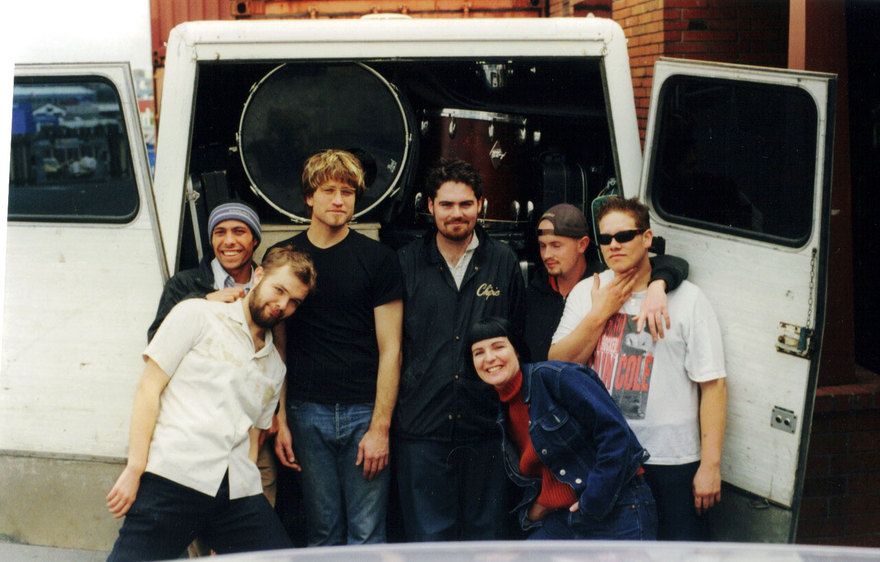
Phoenix Foundation on their first tour, pictured outside the Kings Arms in 2000. The photo includes Lynley Hill (their early manager) and Nic McGowan (sound). The China Cove lineup, it also features Tui Langford (bass) and Noel Phear (drums).
Put one person in charge as tour manager and if he treats it like he’s taking a lot of old age pensioners on a coach trip it should be a really good tour. Everyone should have a sheet telling them what time to get up and so on.
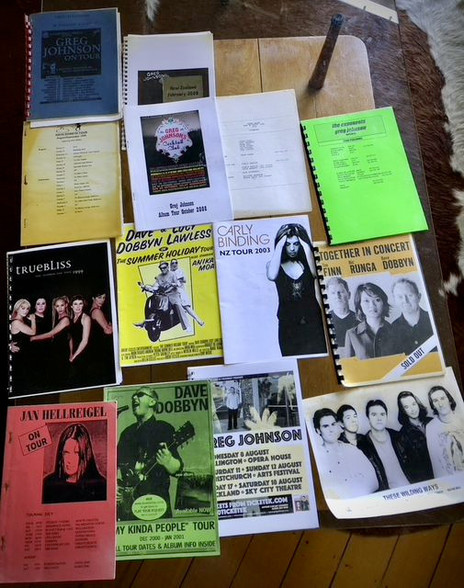
"Everyone should have a sheet telling them what time to get up and so on." Wayne Bell's collection of bound itineraries for large-scale national tours.
Serious Drinking
If you going to get pissed every night you’ll come home from the tour with a shocking cold and feel awful. It’s not worth it.
The Party
If you’ve got a long drive the next morning, don’t go to the party. Or, if you do, make sure two people bed down so they’re fit and well for the drive.
Safety
If there are girls in the band, stay with them all the time. Don’t go wandering around alone in strange places, stick with each other.
Booking Agencies
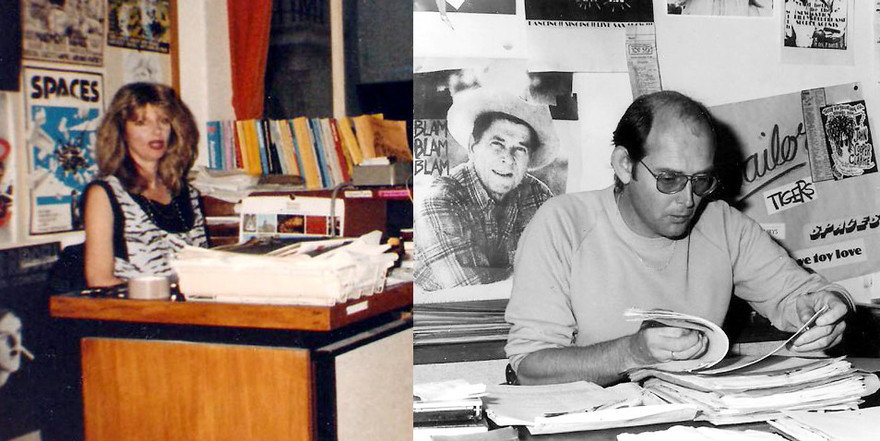
Maxine Morris and Simon Elton at the New Music Management office, early 1980s. - Simon Elton Collection
Booking agencies are the lazy way, at least early on. They’ll charge 10 percent for very little and charge extra for doing all those, things like press kits – which is fair enough, they have to make their money.
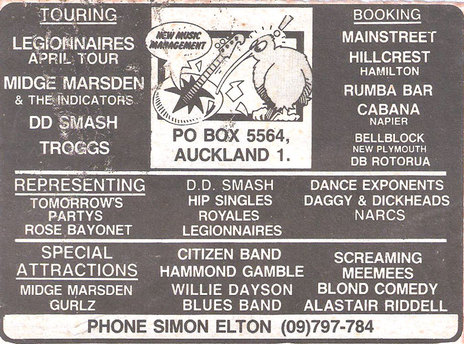
A typical New Music Management ad in Rip It Up. Most issues carried one in between 1980 and 1988.
You may have to use them later on when you get too busy, however, and if you go to them and say: “Look, we haven’t got the time to book the North Island leg of this tour, could you do it?” they’ll be good to you because they know eventually you’re going to get so busy that you can’t do it yourself. Don’t let them be your enemies – that’s stupid.
But you must do it yourself at first or you’ll just get stuck in the job of support band, for the rest of your time.
Remember
Short of vehicles crapping out, gear blowing up, earthquakes, war damage or floods, a tour should not lose money if you’ve done your homework and keep your overheads down.
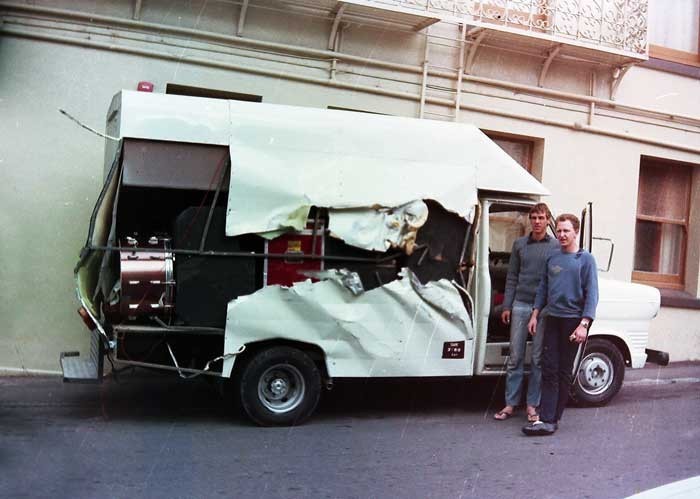
Mike Lynch (soundman), left, and Mark Hayes (lighting technician) beside The Valentinos damaged truck outside the Cabana Hotel following near-fatal road smash, Napier 1980
CONTACTS
This is some information you might find useful. I’ve left out some of the more obvious ones you can look them up yourself. (AudioCulture update, 2023: many venues and the contact names will be out of date, but have been included for historic interest.)
Art Galleries and Other Alternative Venues
Sarjeant Art Gallery Wanganui Paul Rayner; Masterton Art Gallery Neil Rowe; Waikato Art Museum Hamilton Keith McMillar; Christchurch Arts Centre Martin McPherson; Eltham Town Hall Cynthia Douds; Snailclamps Palmerston North the Skeptics; Suter Art Gallery Nelson; Rotorua Art Gallery John Perry; Govett-Brewster Gallery New Plymouth Dick Belt
Academic Institutions
Aside from universities (very good, especially at Orientation time, when a band can make lots of money louring for a month or more) there are teachers’ colleges and technical institutes. All the students’ associations will have an Activities Officer or Entertainment Officer. Some Pubs: Oriental Dunedin Warren Cates; Richmond Oamaru Don Scott; Terminus Timaru Reg McGarry; Woodbourne Blenheim; Bellblock New Plymouth; Ngamotu New Plymouth; Golden Central Alexandra; Rutherford Nelson; Rutland Wanganui; Waikiwi Invercargill.
Other Pubs
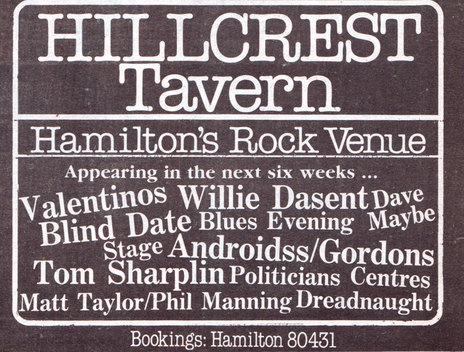
Hillcrest Tavern, October 1981
Hillcrest, Metropole, Hamilton Hotel (Hamilton); Gluepot, Windsor. Globe, Milford Marina, Mon Desir, Esplanade (Auckland); Terminus, Taita, Cricketers Arms, Clyde Quay (Wellington); Gladstone. Star and Garter, Hillsborough Christchurch); Empire (Dunedin); Golden Eagle (Greymouth); Albert (Palmerston North); Cabana (Napier); Greerton (Tauranga); River Bar (Gisborne); Onerahi (Northland).
Other Venues
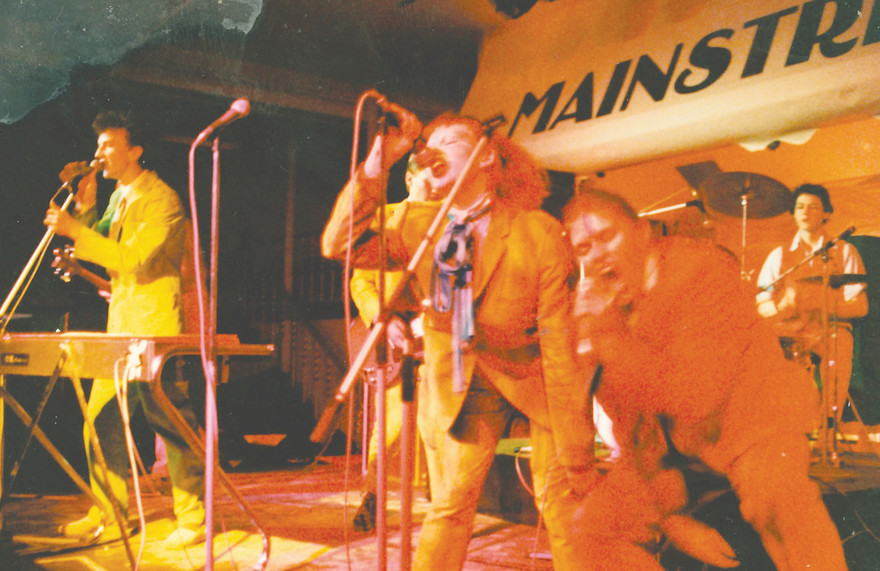
The Plague performing at Mainstreet Cabaret, Auckland. - Richard von Sturmer Collection
Auckland’s Mainstreet, Wellington’s Sheaf and Christchurch’s Zanzibar all, to varying degrees, cater for touring bands.
Press Contacts
Auckland Star, Wendyl Nissen; Christchurch Star, Rob White; Christchurch Press, David Swift; Marlborough Express, Paul Ellis; Otago Daily Times, Nicola Robinson: Timaru Herald, Andrew Fyfe.
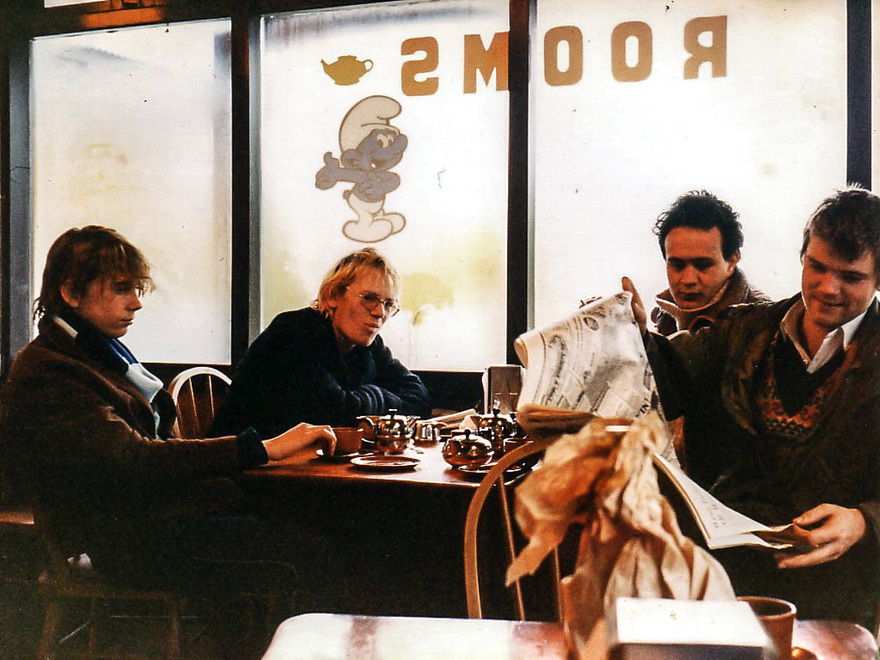
Screaming Blam-matics on tour - Peter van der Fluit and Yoh (Screaming Meemees) with David Rudolph and Tim Mahon (Blam Blam Blam) - Photo by Jenny Pullar
--